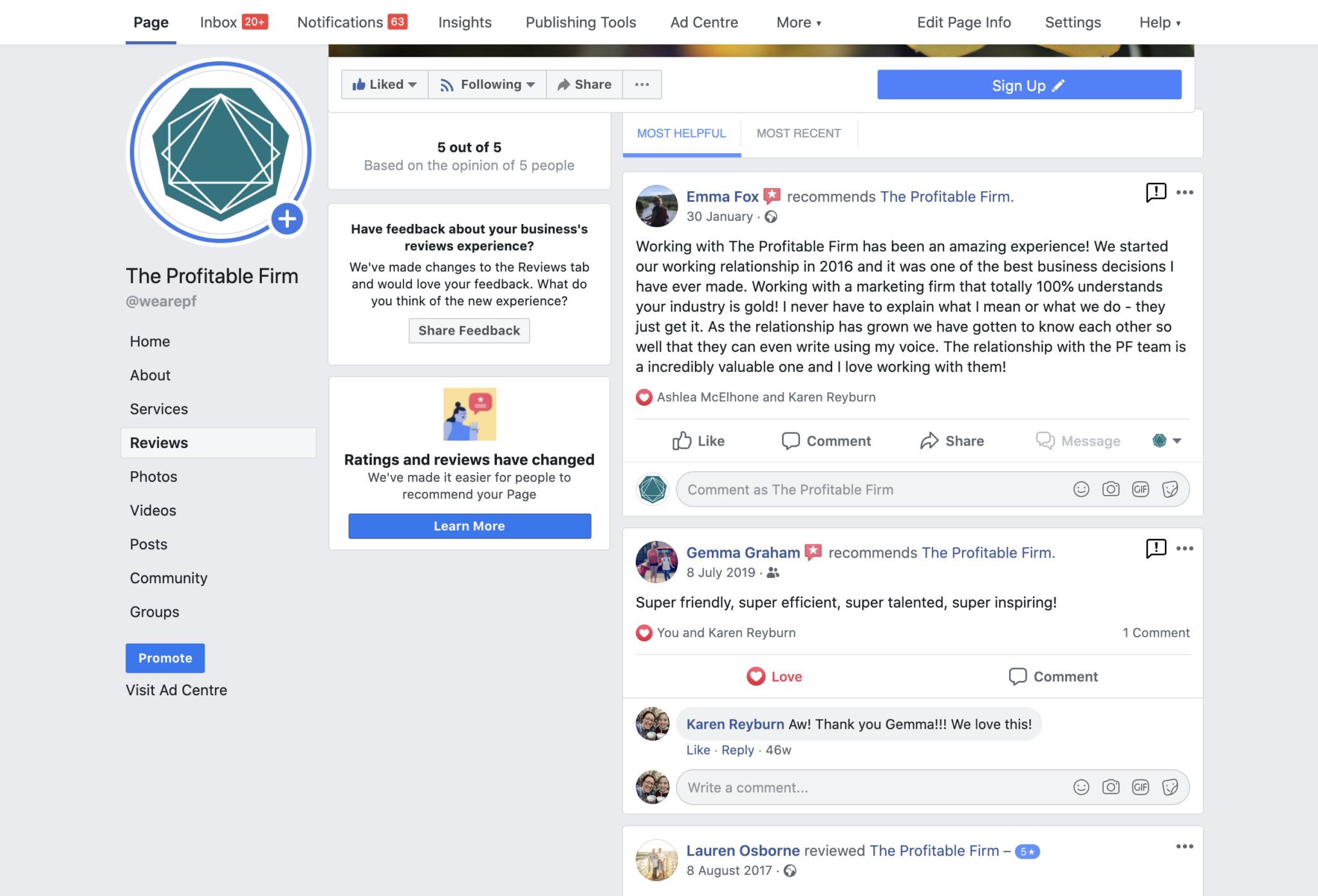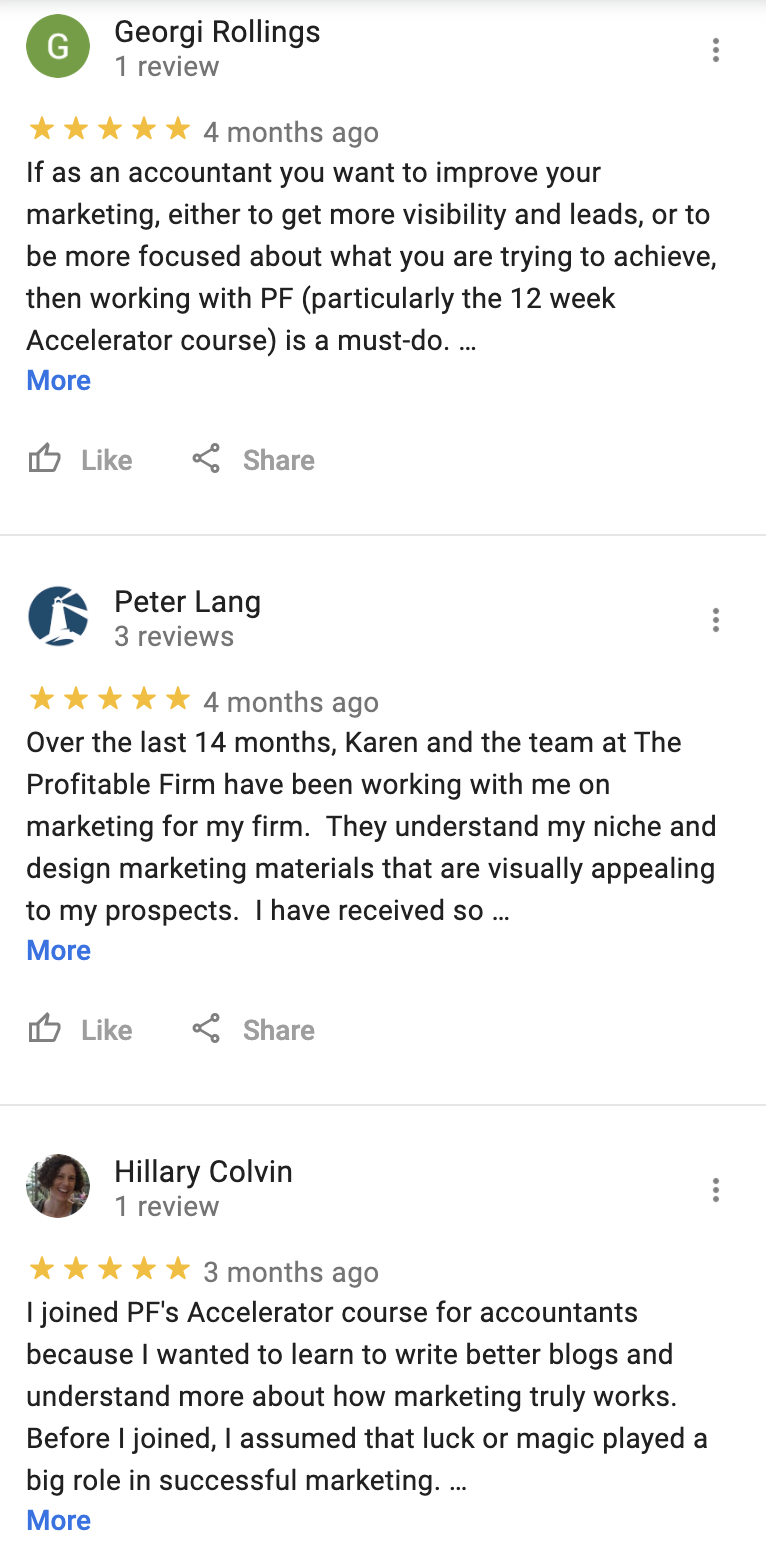
Your clients are really, really thankful for what you’re doing for them right now. You’re helping them get funding and managing payroll and answering questions and (literally in some cases) saving lives. Saving businesses for sure.
Although the current time has a lot that’s messy and awful, and we won’t pretend for a second it’s good, it’s still true there are blessings to be found, and positives to celebrate. There are opportunities to help more people, and display the true value your firm provides.
And one of the ways to show that value – to help people see and believe your value before they ever meet you – is by way of stories. How you’ve helped others who are just like them.
Testimonials.
Case studies.
Reviews.
In particular Google or Facebook reviews, which have the added impact of social proof. You can see the person writing it is a real person, linked to a real business.
It is still a good idea to share testimonials on your website or in your marketing in a way that’s designed well and looks nice: but if it’s not directly embedded from another site, there could be a tiny little doubt in the prospect’s mind that it’s real. (Particularly if they’ve had a bad experience with accountants or other professional services in the past.)
So, how do you go about asking for a Google or Facebook review right now?
Do you ask at all? Or is that tacky and boastful? Is it even allowed?
Reviews must be voluntary and never as a form of payment
Google wants valuable, honest reviews. They specifically state “Business owners shouldn’t offer incentives to customers in exchange for reviews”.
Right now, many accountants are giving far more value than usual. You’re running live webinars, doing more one-to-ones, not charging at the highest level for new services (such as furloughing employees or PPP loans). You’re happy to do it: this is not about making money at every corner – it’s about truly helping people to manage through a very uncertain time.
And then they thank you! They rave about how great you are, tell others (and they tell you about how many people they’ve told), and ask if there’s anything they can do, to let them know.
So it’s only natural to think, well, I’ll ask them for a Google review in thanks for everything we’ve been doing for them.
That’s both okay and not okay.
Okay: Absolutely okay to ask clients for reviews at any time, to thank them for their kind words and ask them to share those and their success stories with others.
Not okay: Never okay to give even the smallest implication that they are posting the review because they got free services from you.
Here are Google’s official guidelines about what’s okay and not okay for reviews.
Ask for reviews as a favour and a kindness: not a quid pro quo
The best way is to ask for a Google or Facebook review so it’s clear this is a favour they’re doing for you, not a “payment” for free work. (We know you wouldn’t intend it that way, but it’s very important this be simply because they think you’re great!)
The way to solve this is:
- Balance the timing of your request: If a client sends you an email saying, “These emails you’re sending out are so valuable! I can’t believe you’re giving us so much even in these tough times!” – you might want to wait a little before saying “Great! Can you put that in a Google review for us?”
- Consider how you ask: Context matters. If you say, “You mentioned how grateful you are for the extra work we’re doing right now – could you write us a review?”, then the inference is you’re asking as a sort of payment. Instead balance your timing, and say something like “It means so much to us that you’ve had a good experience with us as your accountants. Would you mind sharing a review for us here?”
- Ask for reviews on a regular basis: If you send out a survey or questionnaire regularly, add a section at the end saying “If you’ve been really happy, we’d always love to have a Google/Facebook review – here’s the link”.
You will be very grateful once the review comes in: but again, take care with how you show your gratitude. You don’t want to send them a bottle of wine the day after they post a great Facebook review: it could look as if you’re paying them for it. Send a thank you card, and leave the wine for a month or so later.
Ask specific questions so their review isn’t general and vague
The whole point of reviews is to help someone who is a prospective client to think, “That sounds exactly like my experience – I believe this firm can actually help me”.
They need to read about issues, feelings, emotions, and pain…and they also need to read about results, victories, numbers, excitement and hope.
That’s not going to happen if you ask your client for a review and they say:
“This firm is a really good firm. [Owner] is really helpful, and the team are so nice. I wouldn’t hesitate to recommend them to anyone.”
It seems like a good review, but it actually hasn’t done you much good. It’s not specific, hasn’t been thought through, isn’t targeted to a particular kind of person, tells no story, and could apply to any kind of business, any kind of industry, anywhere in the world.
Think ahead to what you want the review to look like. Consider questions like these. You don’t have to give ALL these questions – don’t overwhelm them – but you could pick out a few. Or give them the list, but suggest they answer 3 of the questions.
- How did you feel before you came to us?
- How did you find us? What made you decide to choose us instead of another accountant?
- How did you feel about that choice?
- What results/wins/successes have you had since working with us? (Be specific – give numbers if you are willing!).
- How do you feel now?
- What would you say to someone thinking about working with us?
- How would you describe what we have done for you, to a family member?
Stress they don’t have to answer all the questions, but pick a few.
And if they said a few specIfic things in an email or text, repeat that back and ask them to include it.
You could even suggest a few examples you know of for this client, since you’re the accountant! You could say, “You may want to include the fact that your sales have actually decreased, but your profit has tripled since working with us.” Not only will it help guide their review, it will remind them of the specific results you’ve helped deliver for them.
Here are some more specifics on asking for testimonials from your clients.
What if someone posts a negative review?
Although it’s rare (especially right now), you may from time to time get a disgruntled former client – or even someone who’s not a client at all! – sharing a review which is angry, inaccurate, bitter, or point blank lies.
That is a risk any of us take when running a business and having public pages where reviews can be posted. The idea is that although there may be a negative review from time to time, for any business or any accounting firm, your prospect is looking for the overall picture. And that can include clients who just aren’t a fit, or see things differently than you and the rest of the team. (Sometimes than the rest of the world.) We all know what it’s like to be reading reviews for a restaurant and then there’s that ONE GUY or one person who’s clearly just had the worst day ever. It happens.
In relation to negative reviews, remember:
- They do happen sometimes, to the best of businesses. Don’t take it personally: just deal with it.
- Ask yourself: is there anything true in it? Even if they’re a former client or it was a horrible experience or some of it is just not true, you can still look for anything which will help you be better.
- If it’s untrue or inappropriate, report it. If the review is particularly bad or so untrue you feel it gives an inaccurate picture of your firm, on Facebook you can report the review. They may remove it for you. On Google, you can only flag reviews if they’re truly “inappropriate”. Most of the time we suggest you simply respond to it, briefly and not inviting further discussion.
- Respond to the review with dignity: This is the best possible advice we can give. Don’t rise to the bait. Don’t return fire with fire. Be the better person. If there are things which need to be discussed offline, discuss them offline. If you’ve had every conversation you can possibly have and it’s done no good, acknowledge the review, say you’re sorry they feel that way and you wish them all the best.
- Do not enter into further public discussions about your services or their experiences: If someone truly had a bad experience and is willing to talk to you, offer a call, a meeting, a private discussion. You could include that in your reply, if there’s still room for discussion. The best clients will always tell you or the team first if they’ve had a problem, and will work it through with you one to one until it’s resolved. (And we take our own advice seriously: if there’s anything at all you want to talk to us about which you think is not on, email the team directly. Let’s get it solved for you.)
Ask happy clients for a positive review: If you do have a bad review and you’ve followed all the steps above, you can mitigate its impact by asking truly happy clients to (if they’re willing) share a positive review. Be honest. Say you’ve had this review, and it’s disappointing, but you’ve done everything you can do and you don’t want to enter into further discussions publicly. Ask if they can help you out by sharing a review that gives a fuller picture of your firm.
Google review or Facebook review: which one is better?
So, which platform do you request? Google, or Facebook, or something else?
When in doubt, pick the platform most relevant to the visibility of your firm. For example, if you have an active Facebook group for your clients and prospects, more positive Facebook reviews will help them feel confident the moment they connect with you. Or if you have several physical offices, Google reviews are connected to locations on Google.
There isn’t really a right or wrong answer: either one is good, and actually both are better, because each one has its own advantages.
Google reviews:
- SEO: Google is the biggest search engine, and Google reviews help with search engine optimisation for your accountancy firm
- Keywords: Five star and positive Google reviews helps Google to return your firm in search results for relevant keywords. This is why giving a little direction to clients will help – you could encourage them to mention a specific word or phrase. However, please do not suggest these words if it’s awkward or would be difficult to fit in. Better to have a relevant, personal, human, interesting review than to have one stuffed with keywords.
Make sure you have a Google My Business account set up for your accounting firm. If you don’t yet, start with the link provided, or ask PF for help.


Facebook reviews:
- Biggest social platform: Facebook is literally at the top of the list when it comes to all the social platforms. In 2018 it was number one. In 2020 it’s number one.
- Most people have a login: Although not all of us use it regularly, almost everyone has a Facebook account. It’s easy to connect and review.
- Facebook encourages comments and discussion: While a Google review sits there and may have a reply from the business owner, or a few likes, Facebook has been created for what is, actually, social. So you can start a real conversation – even if the review is a 3 star or 4 star, you’ve got the opportunity to chat to them or DM them or actually do something about it.
You will need a Facebook page for your accounting firm to get reviews – and, we’d suggest, at least several months of posts and comments and engagement first. You don’t want to set up a blank Facebook page, ask for a bunch of reviews, and then just have it sit there for four years. If you found any business having a Facebook page with 8 reviews from 2012 and nothing since then, it wouldn’t mean a lot to you.
We suggest a goal of posting on all the social platforms on a daily basis: but you can work up to this goal by starting with a Facebook page, and posting once a week or so.

Save the kind words in a place you own
Remember these platforms never belong to you, and can be shut down at any time for any reason on their side.
We presume the big giants like Google and Facebook aren’t going anywhere anytime soon (which is a reasonable presumption to make), but if anything happens, you wouldn’t have access to these amazing kind words.
It’s always good to save kind words in one central place – we suggest a Gsheet or Google doc – and then use them on your website, in your social media posts, in case studies, within blog posts. That way you’ve got content which belongs to you and can always be shared in the way you want it to.
Permission is presumed for public reviews, but you can still ask and share
When someone shares a public review on Google or Facebook, the presumption is they’re okay with you sharing it elsewhere. It’s already been shared on a platform visible to anyone in the world.
But if you take portions of their quote and use it in different formats – in a social post, on a website page, in a case study – if for any reason you feel it will come as a surprise to your client, you could send them the draft link (or screenshot) and say “We’re sharing this next week – thanks so much for your kind words!” If anything has changed, they can tell you, and you’ve given them the heads up it’s coming.
Make it really easy for them to post the review
No matter how you do it, just make this really easy for them. First, get the direct links so they don’t have to search for it. Here’s how:
To find your accounting firm’s Facebook reviews link:
Go to your firm’s business page (ie http://facebook.com/wearepf) and either click on Reviews, or just add /reviews to the end of the URL. Then that’s the URL to use, ie: http://facebook.com/wearepf/reviews
Find your accounting firm’s Google reviews link (instructions from Google)
Make it clear you know they are busy, rushing about, have their own business to run: and they’re doing you a favour.
They’re also doing a favour to anyone who ever felt (or will feel) like they did before they came to you. We find clients are often so willing to share a review, because they don’t want anyone else to feel like they felt. Go through what they went through. Waste money they spent. If their bad-turned-good experience could help even one other person, one other business owner, they want to help.
Had a brilliant experience with PF? We’d love to hear about it.
Reviews are simply a summary of a good client experience
Public reviews aren’t the place for detailed discussions on what’s working or not working, fixing broken things, turning relationships round. They’re meant to be a summary of what is already an amazing experience, and you’re just asking them to share it so others can have a good experience, too.
Think of the clients who have had the best (and even longest) client experience with your firm, and ask them for this favour. Both you and they will be glad you did!

